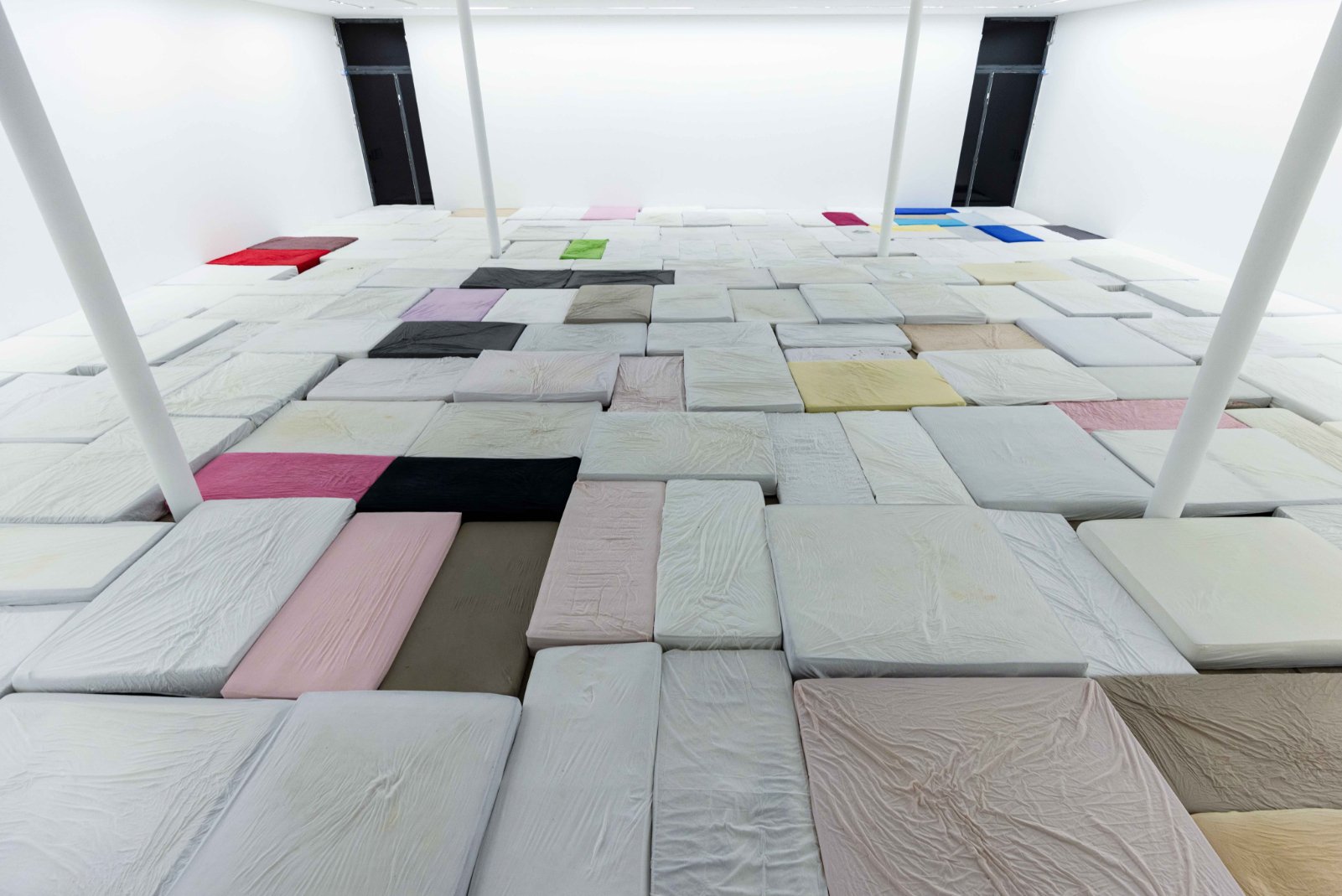interview by Janna Shaw
photographs courtesy the artist
When was the last time you stood up on a mattress, off-kiltered, aware of your balance, or lack thereof? When was the last time you jumped on a bed with friends? When was the last time you jumped on a bed with strangers? When was the last time you played childhood games? Cuddled in a group clad in coats and cloaks? Watched a couple kissing horizontally? Were read a bedtime story late into the evening, with snow falling gently outside?
The KW Institute of Contemporary Art in Berlin is hosting Die Matratzen, a week-long exhibit by Tobias Spichtig, with a nightly changing cast of poets and text-based artists reading their works aloud to an audience perched upon mattresses and sheets, sourced from friends and various collaborators of the artist.
Over the course of Spichtig’s installation, the mattresses are lived in and take on new forms, shifting from their original placement, absorbing the shapes and sounds of their dwellers and run-uponers. In one corner of a mattress, a tiny faded blood stain. Next to it, a rip from a Balenciaga heel, courtesy of that evening’s impromptu game of Tag. The sheets themselves have a collective abstract quality to them, marred with scuffs, prints, and static marks of movement. On view from above, the blocks of foam and springs morph into a perfectly assembled jigsaw puzzle, spanning the full space in its entirety, corner to corner. From here, one can clearly see that the work does not consist of objects in a room, it is the presence and experience of the guests that are on top of them that complete the work. It is an interactive performance.
Janna Shaw spoke with Tobias Spichtig on his opening night of Die Matratzen after a kickoff reading with Karl Holmqvist.
JANNA SHAW: I say this with a sense of peculiar intrigue: you seem a bit of a hoarder. Other exhibits of yours have also included immense amounts of furniture and appliances: tables, fridges, empty bottles of beer, etc. Is this habit of collecting (and later presenting) a form of personal sentimentality, or is it a questioning of use, and of our own existential placement?
TOBIAS SPICHTIG: I like images and objects. I would love to be both them all the time myself. The mattresses in particular are quite loaded and empty at the same time. It’s really abstract and it’s not at the same time. It’s always something more personal than any abstract level can translate. This is what I think objects have as their unique quality.
SHAW: What led you to the concept of archiving objects of rest, rather than curtains of privacy, or cigarette butts of habit?
SPICHTIG: These assemblages kind of stem from wandering through my own apartment during sleepless nights. When I get up and go to the fridge. When I sit at the desk. When I go back to the couch. The places I go when I’m thinking about things.
SHAW: You are a painter as well as a conceptual artist. How would this installation translate onto your canvas? What might that look like?
SPICHTIG: I think all painting is conceptual, and I think works of art are sooner or later about painting. The mattresses are something in between painting and sculpture. It looks like a painting once one looks at it from above or once it is photographed. There is a parallel that runs between objects in real life and painted objects—that parallel is quite abstract, but also where one imagines things. I recently did a series of paintings depicting sunglasses, and now I am working on abstract oil paintings that look a bit like ornaments. I am also doing some portraits.
SHAW: What else are you painting these days?
I recently did a series of paintings depicting sunglasses, and now I am working on abstract oil paintings that look a bit like ornaments. I am also doing some portraits.
SHAW: Do you place importance on sleep and dreaming, or is it simply a necessary function? What is your ideal bed situation? I’m talking look, feel, time, place, activities, smells…
SPICHTIG: I don’t like to go to bed. But then, I also hate getting up. I dream a lot. Sometimes I even sing during sleeping. Is there a medical term for this?
SHAW: There is a whiff here to the opening paragraph of Guy Debord’s 1967 The Society of the Spectacle:
“The whole life of a society in which modern conditions of production prevail, presents itself as an immense accumulation of spectacle. All that was directly lived has become mere representation. Commodities are now all that there is to see.”
There is something rather rebellious to the constructed situation of various mattresses on the ground, placed there for the simple purpose of observing others deriving pleasure. Do you think our society has lost touch with its primal pleasures in our pursuit of greater accumulation and distraction? Or does this world of influx only make us crave our instinctual joys more?
SPICHTIG: To be present with both body and mind, to be more without a screen than with, has become a huge luxury. I love that. I guess everyone craves to be IRL more and more. Reality is the biggest spectacle.
Click here to learn more about Die Matratzen, including it’s late night accompanied live reading program. https://www.kw-berlin.de/en/pause-tobias-spichtig/
Installation images courtesy the artist and Jan Kaps, Cologne; Photos: Tobias Spichtig




